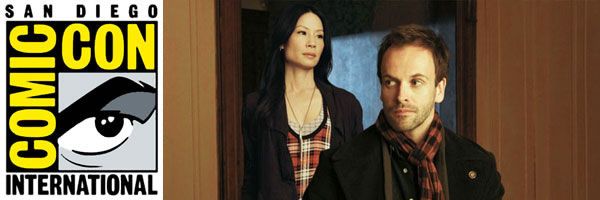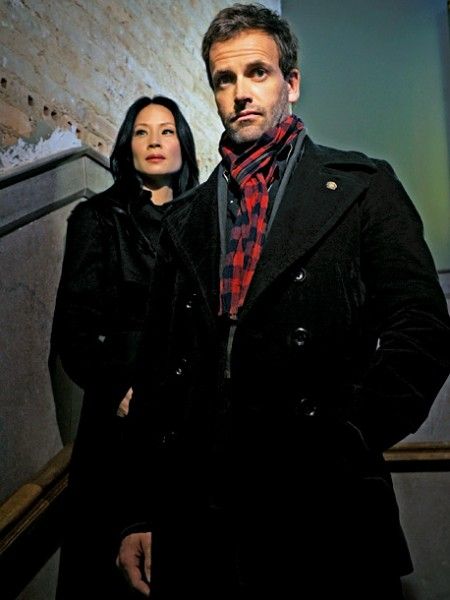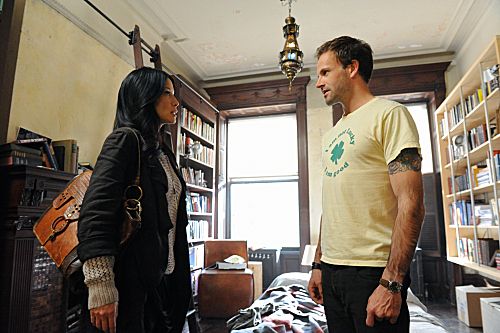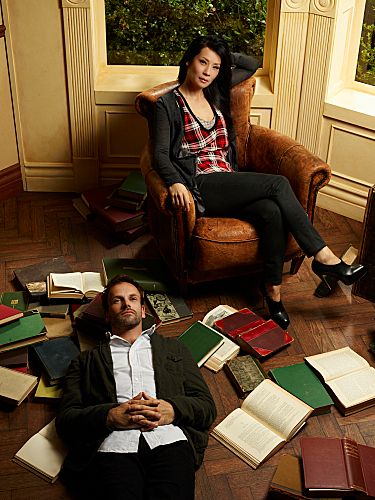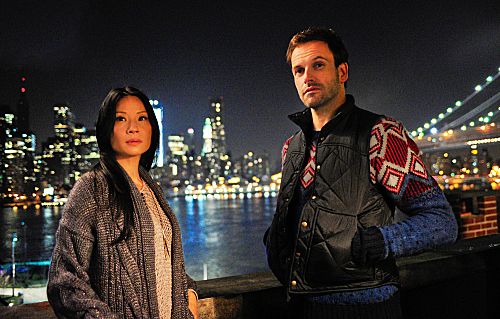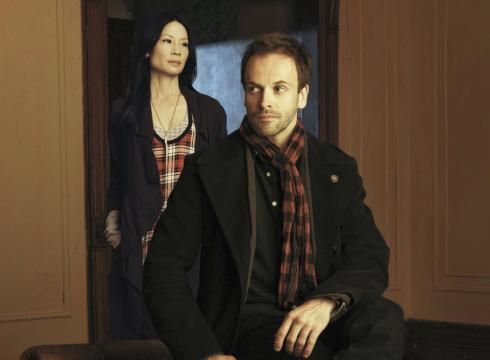Robert Doherty has worked non-stop as a writer-producer in television for over 10 years including writing for and producing Medium for six seasons and most recently serving as consulting producer on Ringer. Carl Beverly executive produces the award-winning cable series Justified and Unforgettable. Together, they are executive producers on CBS’s new series, Elementary, premiering this fall. Doherty will scribe the contemporary reimagining of Arthur Conan Doyle’s creation now set in New York City and oversee the development of the show which promises to have broad appeal and targets the CBS network’s adult 18-34 demographic.
Doherty and Beverly sat down with us at a roundtable interview to talk about their unusual twist on the character of Dr. Watson, why it was important to remain true to the spirit of the original relationship between Holmes and Watson rather than pursue any romantic entanglement, and how the characters’ unique friendship will be an integral part of the show as much as the mysteries they investigate each week. They also discussed their reluctance to introduce additional characters right away in order to develop the main characters and give the audience some time to find the show. Finally, they talked about what Jonny Lee Miller brings to the lead role and addressed comparisons that have been drawn between their new show and the BBC’s highly successful Sherlock.
Question: Can you talk about the twist on the Dr. Watson character? Did you know from the beginning that you wanted Watson to be a woman?
Robert Doherty: Carl initially was the one who brought up the possibility of developing a Sherlock show. I was very familiar with the character. I had always been a fan but needed to re-familiarize myself a bit because so much of what I’d read was when I was younger in school. And so, in addition to re-reading a lot of the stories and books, I read a handful of psychological assessments of the character that real doctors have written up over the years. Somebody classified him as bi-polar. Somebody else thought he had a mild form of Asberger’s. And, one of them happened to mention that he was classified as a gynophobe. He did not have a terrifically healthy relationship with women. He was a little suspicious of them. It just made me laugh when I read it because I was like what would make him crazier than if Watson was a woman. He’s actually living with somebody who is monitoring him and is also a woman. All of that said, our Holmes is not a gynophobe, is not a misogynist. It’s just what got that ball rolling. I also was up for the challenge. I knew that it would be inevitable that people would be fascinated by the ‘will they, won’t they.’ That question would come up. I like that the question is there and that it exists, but I also don’t feel in any rush to … in fact, let me be more blunt. I don’t want them to end up in bed together. That’s just not what the show would go for. I don’t think that would be true to the spirit of the original relationship between the two characters and that’s important to me. I would like to show that a man and a woman can be friends and do this kind of work and live together and not end up romantically entangled.
Carl Beverly: Rob often calls it a bromance, but one of the bros just happens to be a woman. He said that from the very beginning and I think it’s really an apt description. There’s this idea that a man and a woman can’t be together on a show especially without needing to be together sexually or in love or whatever, and this is really about the evolution of a friendship and how that happens. Watching that should be as much the story of this show as the mysteries that you see week in and week out about who killed who. We love that and those stories will be great, but the mystery of this relationship and how the friendships comes into being, that should be something that draws people in every week, too.
[French Journalist] The French people are concerned that your show may borrow from the BBC’s Sherlock and what Steven Moffat has done. Can you talk about that and how your show will be different?
Beverly: We both agree his Sherlock is fantastic.
Doherty: It’s an incredible show. I have nothing but the highest regard for that show and Steven as a writer. I think sometimes there’s some confusion. I think sometimes we catch flak because we are a contemporized Sherlock. Sherlock has been contemporized dating back to the forties. There were movies with Basil Rathbone set in the Victorian era, and then suddenly there were movies with Basil Rathbone in World War II where they’re fighting Nazis. So, the idea has been around a long time. Sherlock has done it extremely well. I think it’s a brilliant show. I’ve only seen the first series, but I hear the second series is just as excellent. But as far as taking from the show, I just don’t think that’s true and Sherlock again has been... because he exists mostly in the public domain, many hands have handled Sherlock over the years and Watson and the premise and the show. He’s been everywhere. He’s been to the future. He’s been to the past. I’ve seen him in comics. I’ve seen him in books. I’ve seen many, many different takes and interpretations on the character and the franchise. They’re all great. I don’t think any of them hurt any of the others. As I was saying to somebody else earlier, Sherlock, the character, has big shoulders and I think he can carry all of us.
Beverly: The French are very smart people. As much as they were open to Sherlock, the series, on the heels of the movie, I think, if it’s good, and if they feel like we’re saying something or doing something original with the character and also honoring the historical truth of the character, I think they’ll give it a shot and I think hopefully they will like it. But, as Rob has said, it’s 120 years later that we’re all attempting to pay honor to an iconic figure including Sherlock. So, we’re all just in love with the same character and the same world and the same kinds of mysteries. Hopefully, the French and the world over, people will be excited and compelled to at least give that a shot, but it definitely will not be … The attempt is not to do what they’re doing. The attempt is to do something original and unique to Rob’s vision for the show and the character.
How much are you drawing on the Conan Doyle stories? Are there going to be references that the fans might pick up on or is it going to be completely new?
Doherty: So far, any Easter eggs we’ve dropped in are very small, and if you blink, you’ll miss them. I like the idea of getting a little bigger and bolder with those things without alienating people who don’t know the stories and the mythology as well as others. We’re not looking to contemporize the old stories. Really, when I look at the source material, what I love and have always loved is the relationship and the mythology. I love those aspects. The cases are brilliant, don’t get me wrong, but it’s not our first order of business. If somebody had a take on one of the stories and it seemed right for our show in New York, with our Sherlock and our Watson, I’m open to it but it’s not our plan for the show. We want to tell our own new Sherlockian mysteries week in and week out.
Will he still have an addiction issue in the show?
Doherty: Will that resurface? It’s funny. It’s the other ‘will they, won’t they.’ Even though, going back to the pitch stage, I always explained that it’s an important part of his story and I think it’s an important aspect of the character, ours and the original, but the show will not live and die with his lingering addiction issues. Is this the case that’s really going to send him over and back into drugs? Again, we want to be as true to that particular problem as we can be, but it’s not what’s going to carry the show week in, week out. There may be a story down the line where it resurfaces, but again, it’s not what drives our show.
How are you dealing with Mycroft?
Doherty: (laughs) Mycroft? I feel like he’s a conversation for us – I mean, the writers now and the producers. I’m interested in getting him into the show, but not in the very near future. I think the character is great. I would want to make sure we have a take on him. I think we’re more likely to see Sherlock’s dad before we see Mycroft.
Is Sherlock’s dad, who hired Watson to be the sober coach, going to make an appearance either by voice or as an actual actor, or is it going to be a Charlie’s Angels type of situation?
Doherty: I think more Robin Masters from Magnum, P.I. With dad, that’s a relationship that Carl and I were excited to get into and talk about and explore over time. For the time being, he’s going to be a very, very mysterious figure.
Beverly: But yet he won’t be a phone call.
Doherty: No, no, no. When we see dad, when dad is really in the show, he will be in the show. There will be a voice and a face. But that’s again a sort of a down-the-line kind of thing.
Beverly: We’re trying to establish Watson and Sherlock’s relationship, so if you start introducing too many characters to the world, you can’t really enjoy their relationship. They don’t even know each other. I think the idea is to live with them a little bit, let them get to know each other, and then slowly start introducing some of these other characters – his father, or some of the other characters we’ve known historically from the series. You just want to give the show some time so the audience can find it, and we feel like if we’re just going for the historically accurate ‘these are the people in the world of Sherlock’ and we drop them in too fast, it’s not quite as satisfying and it might be a little overwhelming for people who aren’t as familiar with the historical characters and don’t know those relationships. It just feels like it might be a little overwhelming so why not take our time and earn the right to do a lot more of that?
How do you balance making Sherlock likeable and audience-relatable with his superpowers of deduction and being a master of disguise?
Doherty: A lot of that comes down to your actor. We’re quite blessed in that regard. We have a tremendously likeable, funny, clever person in Jonny (Jonny Lee Miller). As far as writing it, because Sherlock is fun, he’s forgiven many, many things. I think that’s certainly a quirk of character that works for a lot of successful…you know, House, of course, is based on Sherlock Holmes. House can say the most horrible things in the world, but we like him at the end of the day because he’s good at what he does and he’s capable and he makes us laugh. I think Sherlock has always done that and ours will too.
Beverly: I think it is a function of Jonny Lee Miller and it’s a function of Rob Doherty’s writing, that even when the character is in his worst moments, still there’s something about him that you like. There’s something about him that you forgive. There’s something about him that you’re still curious about. So, if he’s going off on Watson or kind of going after her about something he realizes is true about her past as he does in the pilot, even in that moment where he’s kind of stepping over the line, you don’t hate him for it. You know there’s some truth that he’s trying to suppress and he can’t help himself. When it finally comes out, you’re a little disappointed maybe, but because again Jonny Lee Miller is Jonny Lee Miller and accessible and totally likeable and because Rob wrote such a beautiful script, you still in some way want to root for Sherlock even in his tough moments, even in those bad moments. That really is a function of being blessed with good writing and good acting.
To catch up on all of our Comic-Con 2012 coverage, click here.

